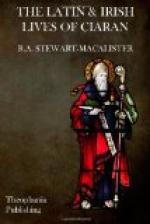The story of the grain cast into the breast of a poor man has come down to us in confusion: it is not clear why the chariot is introduced at all. Probably we have a conflation of two incidents. In the one (which is the version followed by LA, for which see Sec. 26 of that document) Ciaran gave to a pauper a chariot and horses which the prince Oengus son of Cremthann had given him: as that prince belongs to the boyhood stories, it is probable that this incident should be transferred to that section of the Life. In the other incident, which may belong to the Isel period, Ciaran flings grain into the breast of the poor man, where it turns into gold: and we may suppose that the pointless re-transformation of the gold to grain did not take place. A similar tale is told of Saint Aed (VSH, ii, 308). The weird story of the jester who stopped the funeral of Guaire, king of Connacht, famous for his abounding liberality, and demanded a gift of the dead man, is of the same type; we are told that the dead king scooped up some earth with his hand, and flung it into the jester’s lap, where it became pure gold.[21]
XXXVI. THE REMOVAL OF THE LAKE (LA, LB, VG)
The island in the lake was probably a crannog, or artificial fortified island, such as are common on the lakes of Ireland. Fundamentally the story is an evident aetiological myth, intended to account for the existence of some curious swampy hollow. In its present form it is obviously suggested by Matt, xvii, 20. Note that VG does not seem to contemplate the wholesale removal of the lake.
Parallels are not wanting. Findian dried up a lake by prayer (CS, 192); and houses were shifted from the west side to the east side of a flood for the convenience of Colum Cille (LL, 858). Saint Cainnech, finding the excessive singing of birds on a certain island to be an interruption to his devotions, compelled them to keep silence (CS, 376; VSH, i, 161).
XXXVII. CIARAN DEPARTS FROM ISEL (LA, VG)
Parallels.—The nuns of Brigit made a similar complaint against the excessive charity of their abbess (LL, 1598). For the stag compare incident XXI; also the tale of how Brenainn was on one occasion guided by a hound (CS, 116). Ruadan, having given in alms his chariot-horses to lepers, found two stags to take their place (CS, 328).
The Stanza in VG.—The metre is one of the numerous forms of debide, seven-syllable lines with echo-rhymes in which the rhyme-syllable is stressed in the first line, unstressed in the second (as men, taken). The stanza before us is in debide scailte, where the two couplets of the stanza are not linked by any form of sound assonance. The literal translation is: “Although it be low it would have been high / had not the murmuring come // the murmuring, had it not come / it would have been high though it be low.”




